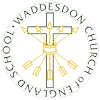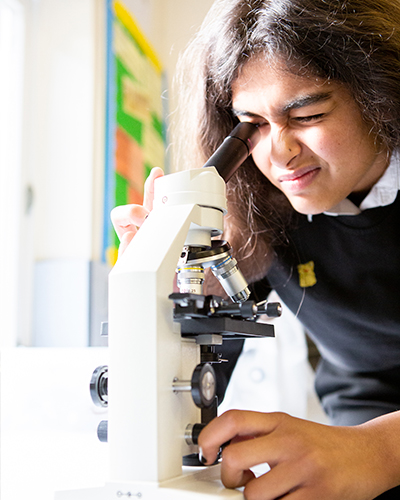
Our daily routines and educational practice are rooted in the twin values of Dignity and Respect.

We believe that the purpose of Science education for all is to enable all students to make moral, ethical and educated predictions about the world around them. Students will use terminology suitable to their level of study in order to make, describe, explain and evaluate these predictions. Through Science at Waddesdon students will have an opportunity to study aspects of Biology, Chemistry and Physics taught by specialists in their subjects. Practical work is at the heart of Science, and encourages and enables students to think deeply and test their ideas. Practical work, and the skills required for this, are therefore embedded into our lessons through all three Key Stages. The diversity of Science ensures that students will improve their skills in other subjects, including the core subjects of Maths, through calculations or graph drawing, and in English, through framing their ideas with supporting evidence.
Dr Dan WestSubject Leader for Science / Data Manager |
Miss Emma LairdSecond in Science |
Mrs Anna EwartScience Teacher |
|
Mr Colin ArblasterPhysics Teacher |
Miss Sarah BrockwellBiology Teacher / Pupil Premium Champion |
Mr Kevin CarrChemistry Teacher |
|
Mrs Kirsty ConnellChemistry Teacher |
Mr Oliver NilanSecond in Science |
Miss Alice RidgwayBiology Teacher |
|
Mr Jeremy SampsonBiology Teacher |
Mr Tim EwartSenior Science Technician / Physics Teacher |
Mrs Vicki HullScience Teacher |
|
Miss Francesca TubbScience Teacher |
Ms Jade ClarkeScience Teacher |
Miss Janice AtackScience Technician |
|
Mrs Sarah BakerScience Technician |
Our intent at KS3 is to introduce students to the key ideas, knowledge and concepts in Science. This gives students a “first glance” at the GCSE topics, embedding review and reflection into their secondary Science curriculum. In this way, some students can be stretched and introduced to GCSE concepts, whilst others will be reviewing and embedding ideas and knowledge that they are taught at KS2, allowing for a vast array of differentiation. The role of the KS3 Science curriculum is also to promote “awe and wonder”; we ensure that many links are made to everyday life in order to make learning relevant and interesting for all. Ethics and morality in Science issues are also introduced through debates and persuasive writing. To further increase the role of Science within the wider school curriculum, students are taken to Whipsnade Zoo, where they undertake an investigation linked to the Environment and Ecosystems unit of work. Key maths, practical and investigative skills are introduced throughout the units, ensuring students have the foundation needed at KS4. This is particularly important with the focus of required practicals in KS4 and 5, and the increase in both quantity and demand of maths questions within Science exam papers.
In February of Year 8, students choose their route through GCSE, to sit either the GCSE Combined Science (Trilogy) or Separate Science courses, both of which have strong proven routes into A Level. They are supported in this decision by their teachers using Science assessment data, maths data and projected FFT20 estimates to inform this decision. Uptake to Separate Science has been sustained over the past years with classes of 30 operating. This curriculum flexibility allows for students who are most interested in Science to spend extra time increasing both their breadth and depth of understanding from Year 9.
In Year 9, whichever pathway is selected, all students are re-introduced to key concepts, knowledge and ideas in Science, and these are consolidated. Year 9 is a year during which students are taught techniques to increase their depth and breadth of understanding, enabling them to know more and remember more. At the end of each topic students are introduced to different revision techniques, and are explicitly taught the 5 steps to successful revision. This is modelled with students, teaching them, for instance, how to condense notes as a mind map, revision cards and revision notes, enabling them to settle on their preferred method at KS4. This work encourages students to become independent learners and means they understand how to learn the content. In addition to this, Year 9 is a year when we introduce many of the practical and maths skills which will become core to their understanding at KS4. During the Biology Cells topic, they are taught conversion of units and rearranging equations. In Chemistry, during the Atomic Structure unit, they are taught the main separation techniques and the laboratory equipment used for this in order to increase their practical competency and begin to develop the skills to become independent in the lab. Through the Chemical Change topic, students are taught key skills with equations, balancing, constructing formula, ionic equations and half equations. In Physics they are introduced to Energy Stores and Pathways and how to use this terminology, which will then be applied across their GCSE. The “awe and wonder” of science is promoted through an independent research project that students complete after returning from visiting the Science Museum in London. This allows students to research an aspect of science that interests them and present it to the class, encouraging students to think like a scientist; that is, to be able to back up ideas with sound scientific knowledge where known, and sound ideas and language where not.
In Years 10 and 11, we are more limited by the demands of the prescribed curriculum. However, we have carefully mapped the key topics to ensure progression both within and between the three disciplines. The KS4 curriculum delves deeper into ideas that have been introduced at KS3, allowing for a review of previous knowledge before deepening this, in many cases with the “why”. The order of the curriculum allows ideas that were introduced in Year 9 to be met and consolidated again in Years 10 and 11. There is a large focus on practical work and the use of this to support students’ critical thinking and understanding of science concepts. As a department, we carry out many more than the 21 required practicals. This ensures students have a deep and solid understanding of investigative skills, working towards the Working Scientifically part of the specification. The department has a bank of exam questions to use in conjunction with this. Likewise, maths skills are built into the curriculum to ensure students revisit the skills highlighted in the maths requirement section of the specification.
Our aim at KS5 is to provide rigorous and academic qualifications which enable the largest number of students to continue their study of Science. In addition to Biology, Chemistry and Physics we introduced an Applied Science course in 2017. In this course, students focus more on investigative skills and the application of science in the community. Students are encouraged to think critically, evaluate knowledge that has been presented to them and present their own ideas and findings in appropriate formats. This specially designed course links to applied routes such as Forensics or Sports Science at university.
Students are introduced to KS5 with a transition period, during which the required key skills are introduced. Moving on to the specifications, students visit topics mapped to allow for progression. Students develop a knowledge and understanding that allows them to explain concepts in greater depth and explain complex scientific ideas. As with previous key stages, we focus again on skills, with practical skills being embedded across our curriculums and many more than the required number of practicals being carried out. This means that students develop into sound scientists, able to carry out the variety of techniques from the specification. The Science department are fully dedicated to promoting students’ study skills. Students have a “bible” where they write up condensed notes for each unit which, along with practice questions, is handed in to staff at the end of unit test for that topic. They also have a list of advisable independent work. This, alongside the practical focus, ensures that students have the independent study skills necessary to succeed with further science education.
Students are taught the following topics in Year 7:
Biology:
Chemistry:
Physics:
Investigation Skills in KS3:
Students are taught the following topics in Year 8:
Biology
Chemistry
Physics
Investigation Skills in KS3:
Students are taught the following topics in Years 9 to 11:
AQA GCSE Biology and AQA Combined Science Trilogy Biology content
AQA GCSE Chemistry and AQA Combined Science Trilogy Chemistry content
AQA GCSE Physics and AQA Combined Science Trilogy Physics content
Students are taught the following topics in Year 12 and 13:
AQA A Level Biology
AQA A Level Chemistry
Physical Chemistry:
Inorganic Chemistry:
Organic Chemistry
AQA A Level Physics
AQA Level 3 Extended Certificate in Applied Science
Unit 1: Key Concepts in Science
Unit 2: Applied Experimental Techniques
Unit 3: Science in the Modern World
Unit 4: Human Body
Unit 5: Investigating Science
Unit 6c: Organic Chemistry

Waddesdon Church of England School’s Assessment and Feedback Policy. At Waddesdon our aim is for assessment to be:
